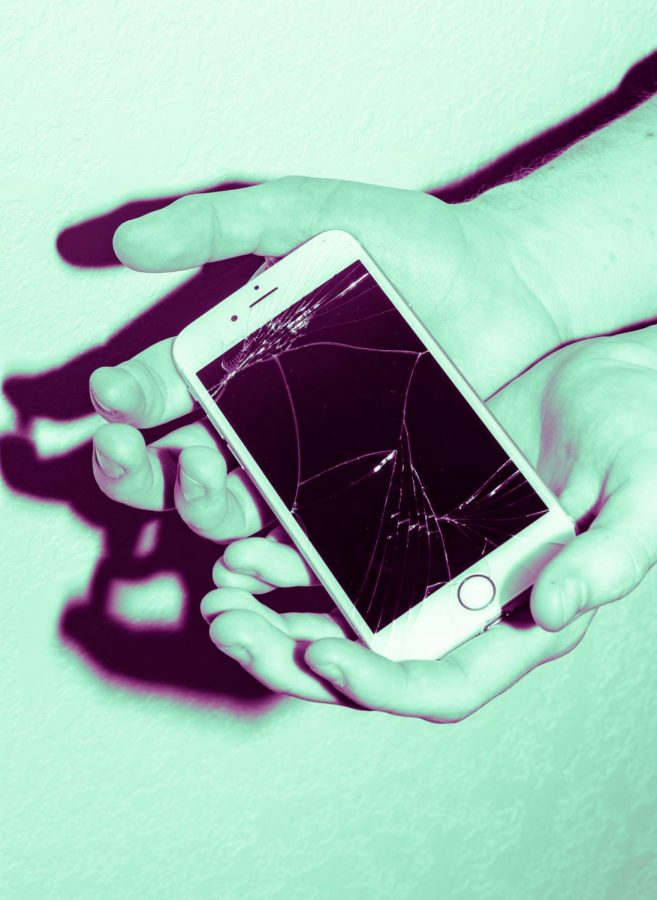OPINION: Electronics companies shouldn’t infringe on people’s right to repair their devices
I’m never buying another Apple product again and you shouldn’t either.
In December, I went to an Apple Store to replace my battery because my iPhone 6s’ charge wasn’t lasting as long. This was going to be the second time I replaced my battery, with the first replacement coming from a third-party shop. When I got there, I waited for 45 minutes, despite having an appointment, only to be told they wouldn’t replace my battery.
The store clerk told me that Apple has a policy of not replacing third-party batteries because they “don’t know how their tools will interact with it.” After this, he told me that I should get a new phone, preferably the latest model of iPhone.
This situation is a minor example of a major issue facing society nowadays. Electronic companies use arbitrary rules and underhanded methods to prevent people from repairing the devices they buy.
Apple’s refusal to touch third-party batteries is justified with the flimsiest of reasons. They don’t know how their tools will interact with third-party batteries? Their tools will probably interact with them about the same as the tools of the roughly 15,000 other repair stores in the U.S.
Alone, this situation could just be seen as Apple attempting to protect itself from liability, but Apple’s heavy restrictions, when contextualized with its other actions, are primarily about preventing phone repair.
In 2009, Apple switched to using a five-point security screw on all of its devices. This screw is proprietary and unique to Apple. There was no reason for Apple to do this, and this decision did nothing but increase the difficulty of repairing phones.
In December 2017, Apple admitted that it deliberately slowed older models of iPhones down with software updates. The company claims it did this to improve performance, but it just so happened that the slowdowns coincided with the releases of newer iPhone models and IOS software.
Apple deliberately inducing slowdowns in older phones is an example of planned obsolescence. Apple is a particularly egregious practitioner of it, but isn’t the only cell phone company to do it.
In October, both Samsung and Apple were fined for planned obsolescence by an Italian court. Apple was fined for its slowdowns, and Samsung was fined for not adequately warning consumers that a software update would cause undue stress on older phones.
Why do cell phone companies and electronics companies get to arbitrarily reduce your ability to enjoy your property? Smart phones can cost between $500 and $1,000, so the idea that that’s only supposed to last two years is ridiculous.
That’s why it’s important to support the electronics right to repair movement. This movement, spearheaded by the Repair Association, is dedicated to enacting legislation to protect people’s right to repair the products they buy.
As of 2018, there are 18 states with right to repair legislation pending, including North Carolina, Tennessee and Virginia. This legislation would require companies to provide information and parts necessary to maintain products to owners.
Unfortunately, companies like Apple and Verizon are fighting against this, by lobbying against these laws in several states.
Not only are these companies deciding when you should have to spend more money, they’re actively fighting against your ability to extend the life of your property.
We hope you appreciate this article! Before you move on, our student staff wanted to ask if you would consider supporting The Appalachian's award-winning journalism.
We receive funding from the university, which helps us to compensate our students for the work they do for The Appalachian. However, the bulk of our operational expenses — from printing and website hosting to training and entering our work into competitions — is dependent upon advertising revenue and donations. We cannot exist without the financial and educational support of our fellow departments on campus, our local and regional businesses, and donations of money and time from alumni, parents, subscribers and friends.
Our journalism is produced to serve the public interest, both on campus and within the community. From anywhere in the world, readers can access our paywall-free journalism, through our website, through our email newsletter, and through our social media channels. Our supporters help to keep us editorially independent, user-friendly, and accessible to everyone.
If you can, please consider supporting us with a financial gift from $10. We appreciate your consideration and support of student journalism at Appalachian State University. If you prefer to make a tax-deductible donation, or if you would prefer to make a recurring monthly gift, please give to The Appalachian Student News Fund through the university here: https://www.givecampus.com/campaigns/54088/donations/new?designation_id=faa93386&


Mend It, Australia • Jan 25, 2019 at 10:11 pm
We are supporting the right to repair movement from Australia. We attended and volunteered at 31 repair cafe events last year to spread the word. No company is going to tell us we can’t remove a ‘void it removed’ warranty sticker. We will care for and maintain what we own, as we must protect ourselves from learned helplessness. We value our sense of agency and will fight vehemently to protect it.
Kaz+Dan
Mend it, Australia on Facebook https://www.facebook.com/mendaussie/
Menditaussie on Instagram